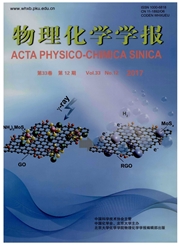

 中文摘要:
中文摘要:
基于国内外最新研究工作,系统总结了离子选择电极膜中革除或减少外增塑剂的新膜基体,包括丙烯酸酯类聚合物、羟基功能化的乙烯基树脂、聚氨酯、硅橡胶以及导电聚合物,对其物理化学性能以及传感器检测等进行了全面归纳与讨论.指出该类革除外增塑剂的传感膜不仅避免了增塑剂的泄漏及其对生物样品的污染,而且较传统增塑聚氯乙烯(PVC)膜扩散系数降低了约3个数量级,有利于抑制过膜离子流。使其检测下限较传统增塑PVC下降了5个数量级,且选择系数也有不同程度的改善.另外,该类传感膜材料由于与固体支撑材料间优良的粘附性保证了电极的使用寿命,特别是在微型化固态电极中.以这类传感膜构建的电位型离子传感器将以其独特的优势在环境监测、食品卫生,尤其是在医疗诊断、生物物质检测中展示出不可替代的作用.
 英文摘要:
英文摘要:
New membrane matrices used in ion selective electrodes, such as polyacrylate, vinyl resin, silicone rubber, polyurethane, and conducting polymer without or with a reduced amount of plasticizer, are systematically summarized based on the latest literature. Physical and chemical properties of these membrane martrices, as well as their resultant potentiometric sensor performance, are reviewed thoroughly. It is pointed out that these new sensing membrane matrices not only avoid plasticizer leakage that would contaminate biological samples, but also reduce the diffusion coefficients of these sensing membranes by about 3 orders of magnitude, which is very helpful to suppress the ion flux. The lower diffusion coefficient results in falling of a lower detection limit by 5 orders of magnitude compared to the traditional plasticized PVC sensing membrane. At the same time, the selectivity coefficients have also been improved. In addition, these new materials have excellent adhesion properties with solid support materials, which ensure long lifetimes of the ion selective electrodes, especially in solid state electrodes. Unique new potentiometric sensors based on these new sensing membrane materials without or with reduced amounts of plasticizer could play an important role in many areas such as environmental monitoring and food safety, and would be especially useful in medical diagnosis and detection of biomaterials.
 同期刊论文项目
同期刊论文项目
 同项目期刊论文
同项目期刊论文
 Longan Shell as Novel Biomacromolecular Sorbent for Highly Selective Removal of Lead and Mercury Ion
Longan Shell as Novel Biomacromolecular Sorbent for Highly Selective Removal of Lead and Mercury Ion DYNAMIC REVERSIBLE ADSORPTION AND DESORPTION OF LEAD IONS THROUGH A PACKED COLUMN OF POLY(M-PHENYLEN
DYNAMIC REVERSIBLE ADSORPTION AND DESORPTION OF LEAD IONS THROUGH A PACKED COLUMN OF POLY(M-PHENYLEN Redox Sorption and Recovery of Silver Ions as Silver Nanocrystals on Poly(aniline-co-5-sulfo-2-anisi
Redox Sorption and Recovery of Silver Ions as Silver Nanocrystals on Poly(aniline-co-5-sulfo-2-anisi 期刊信息
期刊信息
